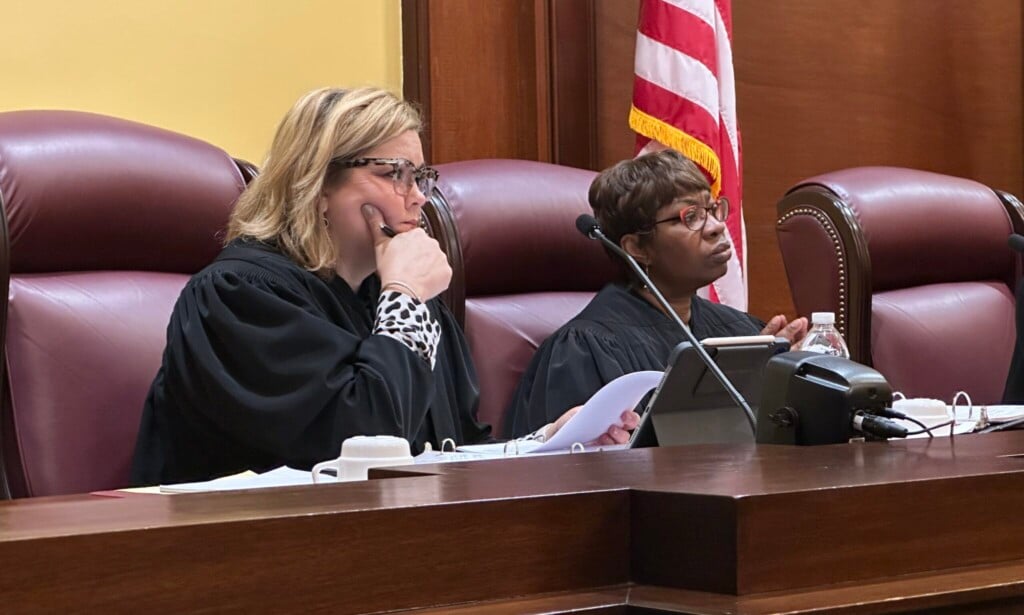Ruby Jean’s Juicery makes national news with sudden elevation to highest taxed property in Jackson County

Photo by Paige Eichkorn
Ruby Jean’s Juicery owner Chris Goode has appealed a 657% property tax increase and plans to sue Jackson County if state representatives aren’t successful in defending his business.
Ruby Jean’s is now the single highest-taxed property in Jackson County and has made national news. The reason it’s so high is that the previous owner of the building did not apply for tax abatement after renovations. When Goode took over, he was left with the rising price.
A physical inspection is required when a property’s taxes are increased by over 15%.
But Goode says no one set foot on his property.
”They don’t know that we need a new roof,” he says. “They don’t know anything about the property. They don’t know that there’s a crack on the south side of the building. Arbitrarily, a computer formula gave us the single largest increase in Jackson County.”
Ruby Jean’s is part of the urban renewal area along Troost Ave, named after prominent slave owner Benoist Troost. It sits on what was once Porter Farm plantation. Any business in the urban renewal area is incentivized to develop and enhance real estate, and should be shielded from taxes through tax abatement.
Ruby Jean’s is a statement of activism in a historically redlined area. It’s the first and only Black-owned, health-conscious concept on the east side of Kansas City.
“We embarked into this foreign territory,” Goode says. “But for me, it was an opportunity to come home.”
Across the street from the juicery sits Goode’s childhood daycare, Operation Breakthrough. He is now the first student to sit on its board of directors.
“My grandmother worked in a linen factory a couple of streets over,” Goode recalls. “We lived east of there, several blocks on Wabash. It was our stretch. We had never encountered healthy offerings, we knew soul food and processed this and processed that. So for me to have the opportunity to bring this concept central to where I first started my matriculation was powerful, and I leaned into it at that point.”
In 2022, Goode used a Small Business Administration loan to buy Ruby Jean’s building from the previous owner. At first, the property taxes were around $2,000. The next year, he was expected to pay $25,000.
“You trudge and trudge up this mountainside and you think you’re standing at a pinnacle of progress for you and for your family and for your community,” Goode says. “A building that just by virtually existing on the west side of Troost, and me being a Black man, I wouldn’t—my grandfather wouldn’t even have been able to buy the building because he was Black. And so it was a very proud moment to buy land on what was decades and decades and decades prior, a plantation. It was a proud moment to purchase this piece of real estate.”
He adds that talking about the previous tax increases still makes him nauseous. It wasn’t realistic; no one has an extra $25,000 lying around when they’re a small business owner selling juice and smoothies.
Goode has filed appeals with Jackson County to have his property reevaluated. He has engaged with stakeholders at every level and even sought legal counsel. He says if it comes down to it, he will sue the county.
“There’s been lawsuits between the state, county and back and forth and all this mudslinging,” He explains. “And in the midst of it, the interest and the penalties are just going and going and going, and then another year stacks on and boom, you have 60,000 plus dollars of a mountain.”
Goode is grateful for the community’s support, despite the Economic Development Corporation of Kansas City and Mayor Quinton Lucas telling him there’s nothing they can do.
“It’s always been a people for us, as always, we exist because of people,” he says. “We are alive because of people. We’re in business because of people, our people internally and our people in the community externally. I’ve always tried to show gratitude for that.”
When residents found out about Goode’s predicament online, they were appalled and started tagging Mayor Lucas.
Lucas replied to a comment on Goode’s LinkedIn post about his tax increase, saying, “Q doesn’t do the property taxes.”
When an NBC Nightly News piece aired, the community pressed the mayor again for a response.
“They’re wondering, like, ‘Hey, you’re the mayor of this city, seeing this business on the brink of getting ousted, and it’s important to our community, what are you going to do?’” Goode asks. “And the second time, many months later, he says, ‘Property tax resides at the county level,’ yet again, completely distancing any involvement. No empathy, no concern. He doesn’t care.”
The irony in that, Goode adds, is that Mayor Lucas stood with him at Ruby Jean’s during his mayoral campaign kickoff in 2018.
“He was proud to stand there and put his flag in the ground to be mayor of Kansas City,” he notes. “I’m a small business owner that sells juice. I’m not a politician. That’s that’s outside of my purview, right? But he was able to stand on my shoulders to be elected. And then when the time comes for us to say, ‘Hey, can you can you get us a conversation? Can you show any concern?’ — ‘Q doesn’t do the taxes,’”
Tax abatements are approved through the Economic Development Corporation of Kansas City, so the mayor actually would have a role in approval for businesses within the urban renewal area.
The mayor’s office has not provided an official comment to The Pitch.
Goode has spoken with Frank White, Jackson County executive and Gail McCann Beatty, county property assessment director to try to amend the previous owner’s error.
“Everybody’s tossing their hands up.”
Marshanna Smith, public information officer for Jackson County, noted that Missouri state law requires Jackson County to reassess approximately 300,000 parcels every two years. She also noted that Goode filed a Certificate of Value certifying that the building, when he purchased it, included no personal property and reflected the purchase price of $918,500.
Goode says he never filed a Certificate of Value.
Smith says the County reassessed the property as of January 1, 2023, and determined its market value to be $847,000—approximately 10% less than the price the owner paid.
“The Certificate of Value is one tool for measuring the accuracy of assessments, and in this case, it confirms the county’s valuation was fair and reasonable,” she adds.
The increase in the property’s assessed value reflects both significant improvements made to the property prior to its sale and broader changes in market conditions, Smith explains. Goode’s investment and enhancement of the urban renewal area should be enough to excuse them from these harsh tax penalties, he adds.
Dan Moye, vice president of land development at the EDC says their incentives are designed around improvements to a building, not just keeping owner’s taxes from going up.
“My understanding is that [Goode] didn’t have any investment into his property that would allow us to get a property tax abatement,” Moye explains.
He agreed that Ruby Jean’s would have been eligible a few years ago after the previous owner completed renovations.
“I’m not an appeal expert, that’s a Jackson County process,” Moye says. “To me, just looking at the value, it seems like a high value for that property. It’s valued almost a million dollars, that seems high, but he’s got to prove his case to Jackson County.”
Goode agrees, but says that if the EDC is incentivizing people to develop, they shouldn’t let his business be displaced because of paperwork.
“That’s weaponizing taxation, right?” he asks.
Diane Mares and Herb Harrington drive to Ruby Jean’s from Prairie Village and the other side of Swope Park for their healthy breakfast and lunch options.
“I’m keto, in fact I just had the keto wrap—it was to die for,” Mares says.
The tax increase isn’t fair and she’d donate to the cause to keep the juicery open, she adds.
Jasmine Brooks, another customer, has visited the juicery three times in the past week.
“It’d be extremely sad if Ruby Jean’s closed,” Brooks says. “I think for the location and for our city, it’s really big to have healthy, quality food that’s accessible. And it being on Troost, I think is a huge deal, just given the history of Troost.”
If Ruby Jean’s left and another company took over, it would be unfair for them to receive tax abatement, she adds.
“Hopefully, something can happen to where they can continue to stay,” Brooks says. “The only other healthy food option that I know that is in the city is that’s even remotely close, maybe downtown. And this is Black-owned too. So this feels like it’s for our community, and so to see that being taken away is disheartening.”






